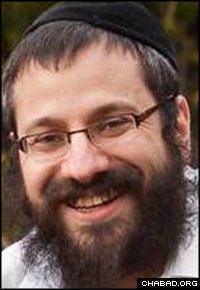As the day winds down at coalition headquarters in Kabul and the Friday afternoon sun begins its descent in the Afghanistan sky, a group of Jewish soldiers gathers for a pre-Shabbat infusion of spiritual inspiration.
Inside a room at Camp Eggers, home to the multinational Combined Security Transition Command-Afghanistan, the small community – on any given week, the group numbers from five to 10 Jewish soldiers – listen to words of Torah taught by a Chabad-Lubavitch rabbi halfway around the world. They then light the Shabbat candles, conduct a prayer service and make a kiddush in honor of the holy day.
U.S. Army Col. David Everett, 56, remembers the routine well. Stationed at Camp Eggers from February to June of 2009, he helped arrange the weekly conference calls between Kabul and the offices of Rabbi Mendel Silberstein, director of Chabad-Lubavitch of Larchmont and Mamaroneck, N.Y.
Serving as a senior military advisor to the chief of police in Kabul, Everett – an attorney and army reserve soldier who, after serving in the Persian Gulf in 1991 and Iraq in 2005, volunteered to deploy to Afghanistan – was welcomed by the handful of Jewish soldiers. Like them, he was both passionately patriotic and deeply committed to his faith.
“I felt that I could make a significant contribution to Afghanistan … in Operation Enduring Freedom,” he says.
Born into a family of veterans, Everett felt that his skill set and more than 30 years of experience in the U.S. Army would be helpful in the effort to train the Afghan military and civilian police to protect themselves against Taliban insurgents and Al Qaeda-backed terrorists.
Upon his arrival, he corresponded regularly with Silberstein, whom he met when the rabbi moved to his suburban New York town in 2006. One detail Everett shared with Silberstein was that while the base’s Jewish group benefited from a lay leader, they really could use the influence of a rabbi.
“It is important to keep one’s connection to G‑d alive while so far away from Jewish life,” says Everett.
So began the ongoing weekly custom of members of the group gathering around a speakerphone from their base in the Afghan capital to dial a string of numbers and connect to Silberstein in New York, where the time is about 9 a.m.
“I share thoughts on the weekly Torah portion and on any topics pertaining to events surrounding the soldiers’ lives,” says Silberstein.
Indicative of life in a war zone, the conversation has at times turned to tragedy, such as when two Jewish personnel from Camp Eggers perished when their convoy encountered a roadside bomb in May. Mourning the loss of their friends – 1st Lt. Roslyn Schulte of Missouri and Shawn Pine, a former Army ranger who was working as a contractor to train Afghan army soldiers – the group looked to Silberstein for support and encouragement.
“The rabbi spoke to us about loss,” recalls Everett. “We focused on the Jewish soul and afterlife, and the Jewish view on death and mourning.”
That Shabbat, Silberstein’s Chabad House held a memorial for the fallen.
“The community knows about our connection,” Silberstein says of the relationship with Camp Eggers. “And this created an even stronger connection.”
The Friday afternoon gatherings even got the attention of one of the base’s non-Jewish chaplains.
“Thank you for doing this for the troops,” he wrote to Silberstein in an e-mail, “for inspiring them.”

Life in a Combat Zone
For Passover, Silberstein helped Everett conduct a Seder at the U.S. Embassy near the base. Everett had reached out to the embassy on behalf of Jewish soldiers who were unable to travel the treacherous roads leading to Bagram Air Base, and the staff was happy to oblige. They turned to the Aleph Institute, a Chabad-Lubavitch organization in Florida that supports Jewish soldiers and inmates, for supplies like kosher grape juice and hand-baked matzah.
Everett, however, needed some coaching from Silberstein before the holiday.
“I marked up the Haggadah” during the conversation with Silberstein, “so that we would know which parts we had to say in order for it to be a kosher Seder,” says Everett.
In the end, some 25 people arrived at the embassy; in keeping with regulations, they were all fully armed.
“You don’t see people going to Seders packing pistols too often,” quips Everett.
Looking back at his time in Afghanistan, Everett says that the pre-Shabbat gatherings helped him handle the stresses of military service.
“You make decisions every day that could mean life or death,” he explains. “Combat zones make for very stressful situations, and it is important to keep your connection to G‑d so that you act ethically and morally.”
Of his friends still serving at the base, he notes that they continue to benefit from learning with Silberstein.
“They are thrilled with the fact that they can listen to words of Torah,” he says, “putting them in touch with their faith in a very meaningful and practical way.”





Join the Discussion